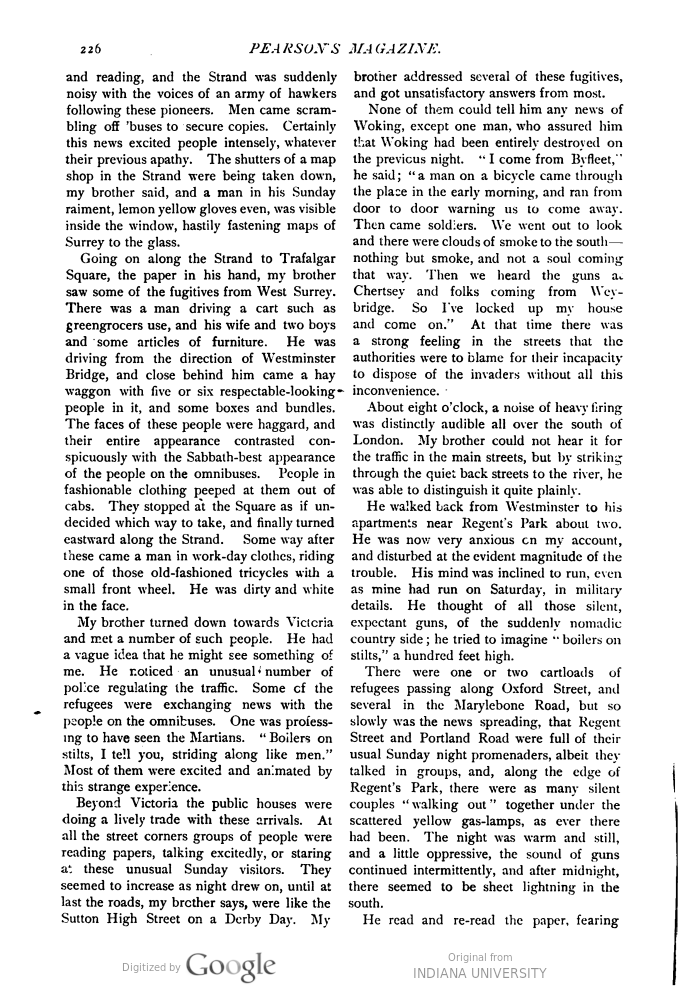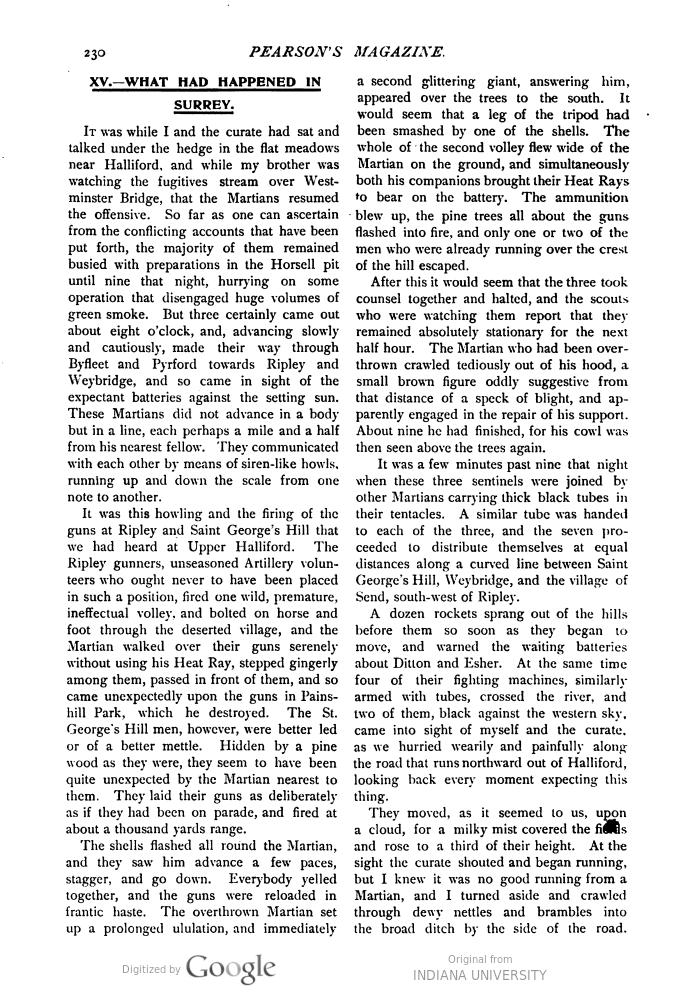Note: This page has been annotated with critical, historical, and cultural notes using the web annotation tool Hypothesis. You may view these annotations in the sidebar on the right-hand side of this page. Use the arrow icon to minimize the sidebar. A text-to-speech compatible transcript of the annotations for this page is available here.
The War of the Worlds in Pearson’s Magazine
Installment 5 of 9 (August 1897)
Pages from Pearson’s Magazine courtesy of HathiTrust, digitized by Google from originals at Indiana University.
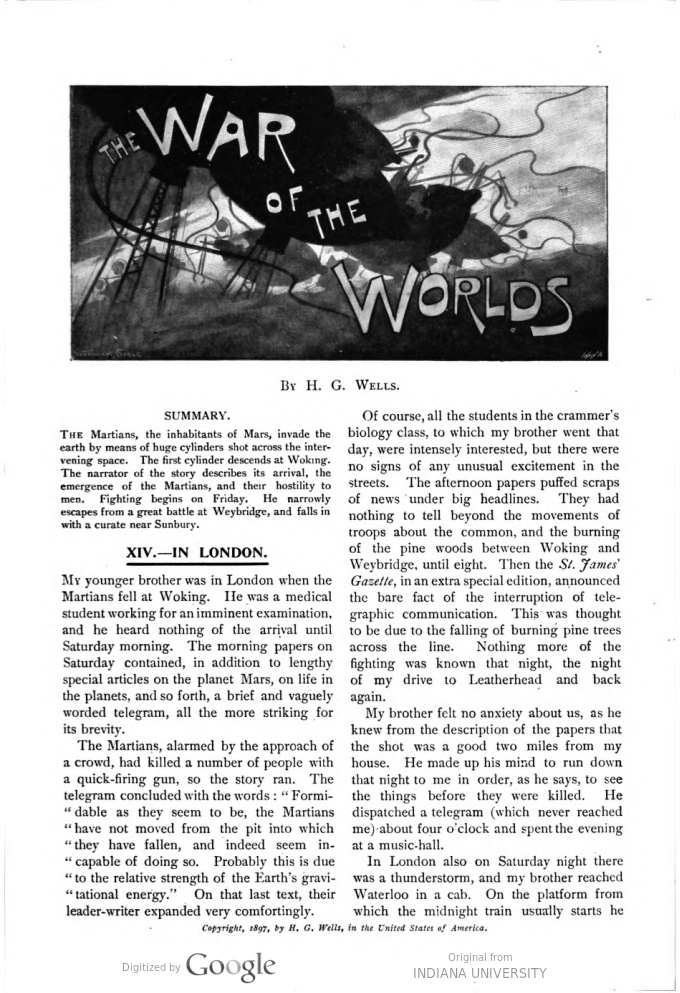
[text marker: start page 221]
THE WAR OF THE WORLDS
BY H. G. WELLS
SUMMARY.
The Martians, the inhabitants of Mars, invade the earth by means of huge cylinders shot across the intervening space. The first cylinder descends at Woking. The narrator of the story describes its arrival, the emergence of the Martians, and their hostility to men. Fighting begins on Friday. He narrowly escapes from a great battle at Weybridge, and falls in with a curate near Sunbury.
XIV.―IN LONDON.
My younger brother was in London when the Martians fell at Woking. He was a medical student working for an imminent examination, and he heard nothing of the arrival until Saturday morning. The morning papers on Saturday contained, in addition to lengthy special articles on the planet Mars, on life in the planets, and so forth, a brief and vaguely worded telegram, all the more striking for its brevity.
The Martians, alarmed by the approach of a crowd, had killed a number of people with a quick-firing gun, so the story ran. The telegram concluded with the words: “Formidable as they seem to be, the Martians have not moved from the pit into which they have fallen, and indeed seem incapable of doing so. Probably this is due to the relative strength of the earth’s gravitational energy.” On that last text, their leader-writer expanded very comfortingly.
Of course, all the students in the crammer’s biology class, to which my brother went that day, were intensely interested, but there were no signs of any unusual excitement in the streets. The afternoon papers puffed scraps of news under big headlines. They had nothing to tell beyond the movements of troops about the common, and the burning of the pine woods between Woking and Weybridge, until eight. Then the St. James’ Gazette, in an extra special edition, announced the bare fact of the interruption of telegraphic communication. This was thought to be due to the falling of burning pine trees across the line. Nothing more of the fighting was known that night, the night of my drive to Leatherhead and back again.
My brother felt no anxiety about us, as he knew from the description in the papers that the shot was a good two miles from my house. He made up his mind to run down that night to me in order, as he says, to see the things before they were killed. He dispatched a telegram (which never reached me) about four o’clock, and spent the evening at a music-hall.
In London also on Saturday night there was a thunderstorm, and my brother reached Waterloo in a cab. On the platform from which the midnight train usually starts he [text marker: end page 221]

[text marker: start page 222] learnt, after some waiting, that an accident prevented trains from reaching Woking that night. The nature of the accident he could not ascertain. Indeed the railway authorities did not clearly know at that time. There was very little excitement in the station, as the officials, failing to realise that anything further than a breakdown between Byfleet and Woking Junction had occurred, were running the theatre trains which usually passed through Woking round by Virginia Water or Guildford. They were busy making the necessary arrangements to alter the route of the Southampton and Portsmouth Sunday League Excursions. A nocturnal newspaper reporter, mistaking my brother for the traffic manager, whom he does to a slight extent resemble, waylaid and tried to interview him. Few people, excepting the railway officials, connected the breakdown with the Martians.
I have read in another account of these events that on Sunday morning “all London was electrified by the news from Woking.” As a matter of fact there was nothing to justify that very extravagant phrase. Plenty of people in London did not hear of the Martians until the panic of Monday morning. Those who did took some time to realise all that the hastily worded telegrams in the Sunday papers conveyed. The majority of people in London do not read Sunday papers.
The habit of personal security, moreover, is so deeply fixed in the Londoner’s mind, and startling intelligence so much a matter of course in the papers, that they could read without any personal tremors: —“About seven o’clock last night the Martians came out of the cylinder, and, moving about under an armour of metallic shields, have completely wrecked Woking station with the adjacent houses, and massacred an entire battalion of the Cardigan Regiment. No details are known. Maxims have been absolutely useless against their armour. The field guns have been disabled by them. Flying Hussars have been galloping into Chertsey. The Martians appear to be moving slowly towards Chertsey or Windsor. Great anxiety prevails in West Surrey, and earthworks are being thrown up to check the advance Londonward.” That was how the Sunday Sun put it, and a clever, and remarkably prompt “hand-book” article in the Referee, compared the affair to a menagerie suddenly let loose in a village.
No one in London knew positively of the nature of the armoured Martians, and there was also a fixed idea that these monsters must be sluggish—“crawling,” “creeping painfully.” such expressions occurred in almost all the earlier reports. None of the telegrams could have been written by an eye-witness of their advance. The Sunday papers printed separate editions as further news came to hand, some even in default of it. But there was practically nothing more to tell people until late in the afternoon, when the authorities gave the press agents the news in their possession. It was stated that the people of Walton and Weybridge, and all that district, were pouring along the roads Londonward, and that was all. [text marker: end page 222]
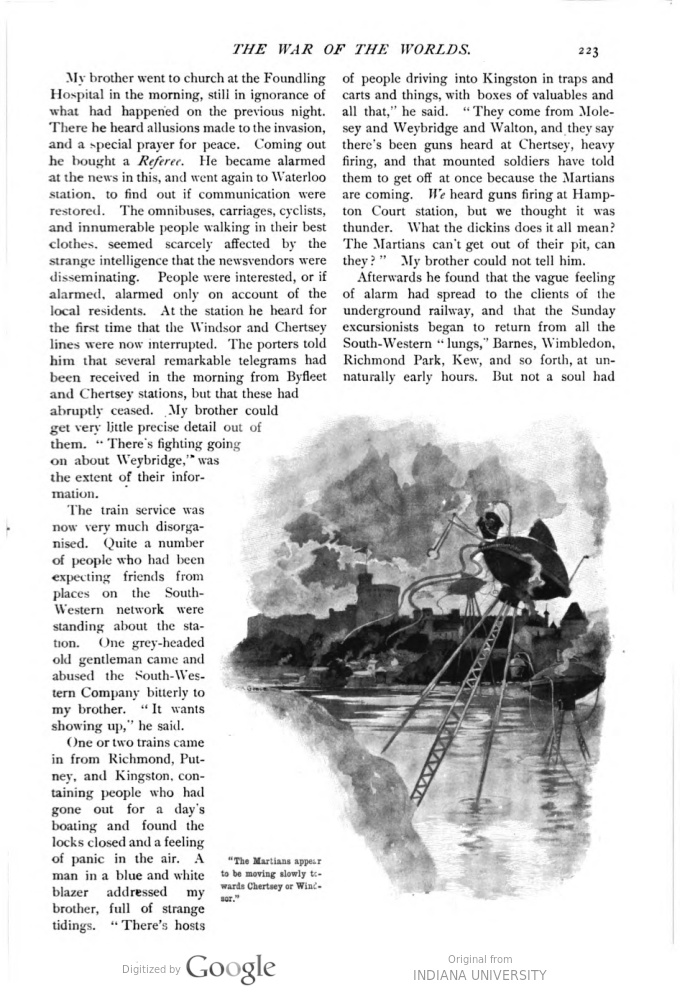
[text marker: start page 223] My brother went to church at the Foundling Hospital in the morning, still in ignorance of what had happened on the previous night. There he heard allusions made to the invasion, and a special prayer for peace. Coming out he bought a Referee. He became alarmed at the news in this, and went again to Waterloo station, to find out if communication were restored. The omnibuses, carriages, cyclists, and innumerable people walking in their best clothes, seemed scarcely affected by the strange intelligence that the newsvendors were disseminating. People were interested, or if alarmed, alarmed only on account of the local residents. At the station he heard for the first time that the Windsor and Chertsey lines were now interrupted. The porters told him that several remarkable telegrams had been received in the morning from Byfleet and Chertsey stations, but that these had abruptly ceased. My brother could get very little precise detail out of them. “There’s fighting going on about Weybridge,” was the extent of their information.
The train service was now very much disorganised. Quite a number of people who had been expecting friends from places on the South-Western network were standing about the station. One grey-headed old gentleman came and abused the South-Western Company bitterly to my brother. “It wants showing up,” he said.
One or two trains came in from Richmond, Putney, and Kingston, containing people who had gone out for a day’s boating and found the locks closed and a feeling of panic in the air. A man in a blue and white blazer addressed my brother, full of strange tidings. “There’s hosts of people driving into Kingston in traps and carts and things, with boxes of valuables and all that,” he said. “They come from Molesey and Weybridge and Walton, and they say there’s been guns heard at Chertsey, heavy firing, and that mounted soldiers have told them to get off at once because the Martians are coming. We heard guns firing at Hampton Court station, but we thought it was thunder. What the dickens does it all mean? The Martians can’t get out of their pit, can they?” My brother could not tell him.
Afterwards he found that the vague feeling of alarm had spread to the clients of the underground railway, and that the Sunday excursionists began to return from all the South-Western “lungs,” Barnes, Wimbledon, Richmond Park, Kew, and so forth, at unnaturally early hours. But not a soul had [text marker: end page 223]
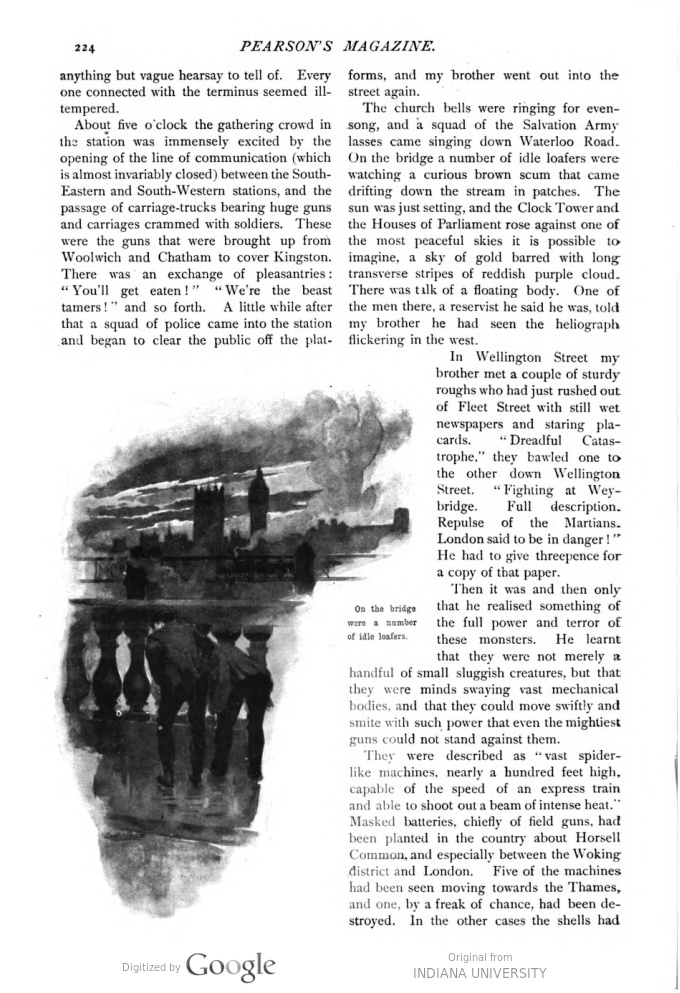
[text marker: start page 224] anything but vague hearsay to tell of. Everyone connected with the terminus seemed ill-tempered.
About five o’clock the gathering crowd in the station was immensely excited by the opening of the line of communication (which is almost invariably closed) between the South-Eastern and the South-Western stations, and the passage of carriage-trucks bearing huge guns and carriages crammed with soldiers. These were the guns that were brought up from Woolwich and Chatham to cover Kingston. There was an exchange of pleasantries: “You’ll get eaten!” “We’re the beast-tamers!” and so forth. A little while after that a squad of police came into the station and began to clear the public off the platforms, and my brother went out into the street again.
The church bells were ringing for evensong, and a squad of Salvation Army lasses came singing down Waterloo Road. On the bridge a number of idle loafers were watching a curious brown scum that came drifting down the stream in patches. The sun was just setting, and the Clock Tower and the Houses of Parliament rose against one of the most peaceful skies it is possible to imagine, a sky of gold barred with long transverse stripes of reddish purple cloud. There was talk of a floating body. One of the men there, a reservist he said he was, told my brother he had seen the heliograph flickering in the west.
In Wellington Street my brother met a couple of sturdy roughs who had just rushed out of Fleet Street with still wet newspapers and staring placards. “Dreadful Catastrophe!” they bawled one to the other down Wellington Street. “Fighting at Weybridge! Full description. Repulse of the Martians. London said to be in danger!” He had to give threepence for a copy of that paper.
Then it was and then only that he realised something of the full power and terror of these monsters. He learnt that they were not merely a handful of small sluggish creatures, but that they were minds swaying vast mechanical bodies, and that they could move swiftly and smite with such power that even the mightiest guns could not stand against them.
They were described as “vast spider-like machines, nearly a hundred feet high, capable of the speed of an express train and able to shoot out a beam of intense heat.” Masked batteries, chiefly of field guns, had been planted in the country about Horsell Common, and especially between the Woking district and London. Five of the machines had been seen moving towards the Thames, and one, by a happy chance, had been destroyed. In the other cases the shells had [text marker: end page 224]
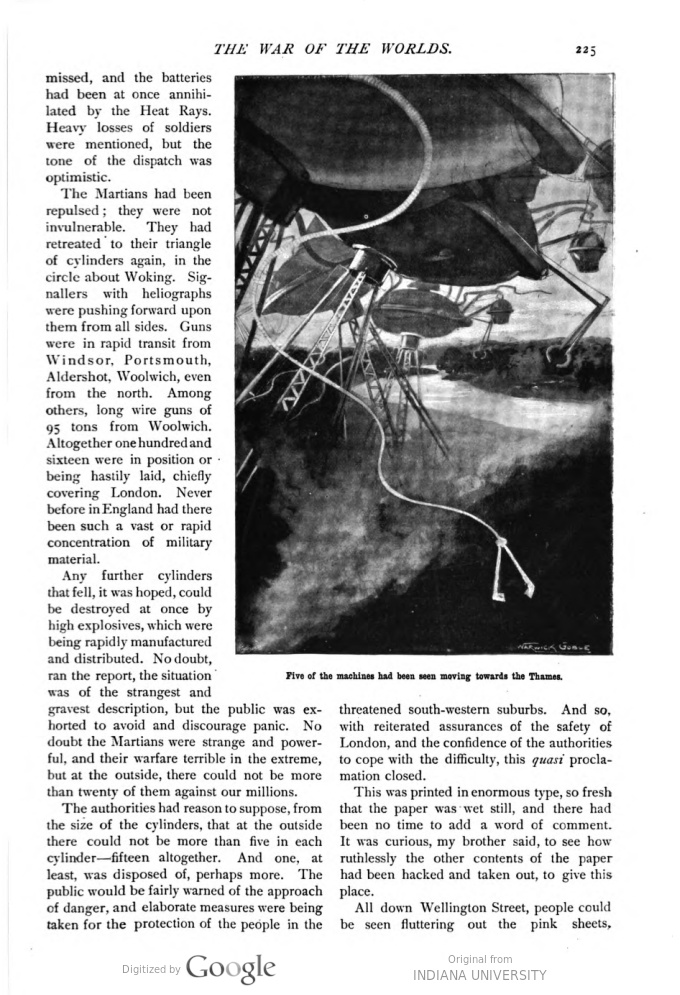
[text marker: start page 225] missed, and the batteries had been at once annihilated by the Heat Rays. Heavy losses of soldiers were mentioned, but the tone of the dispatch was optimistic.
The Martians had been repulsed; they were not invulnerable. They had retreated to their triangle of cylinders again, in the circle about Woking. Signallers with heliographs were pushing forward upon them from all sides. Guns were in rapid transit from Windsor, Portsmouth, Aldershot, Woolwich, even from the north. Among others, long wire guns of ninety-five tons from Woolwich. Altogether one hundred and sixteen were in position or being hastily laid, chiefly covering London. Never before in England had there been such a vast or rapid concentration of military material.
Any further cylinders that fell, it was hoped, could be destroyed at once by high explosives, which were being rapidly manufactured and distributed. No doubt, ran the report, the situation was of the strangest and gravest description, but the public was exhorted to avoid and discourage panic. No doubt the Martians were strange and powerful, and their warfare terrible in the extreme, but at the outside, there could not be more than twenty of them against our millions.
The authorities had reason to suppose, from the size of the cylinders, that at the outside there could not be more than five in each cylinder—fifteen altogether. And one, at least, was disposed of, perhaps more. The public would be fairly warned of the approach of danger, and elaborate measures were being taken for the protection of the people in the threatened south-western suburbs. And so, with reiterated assurances of the safety of London, and the confidence of the authorities to cope with the difficulty, this quasi proclamation closed.
This was printed in enormous type, so fresh that the paper was still wet, and there had been no time to add a word of comment. It was curious, my brother said, to see how ruthlessly the other contents of the paper had been hacked and taken out, to give this place.
All down Wellington Street, people could be seen fluttering out the pink sheets, [text marker: end page 225]
[text marker: start page 226] and reading, and the Strand was suddenly noisy with the voices of an army of hawkers following these pioneers. Men came scrambling off ’buses to secure copies. Certainly this news excited people intensely, whatever their previous apathy. The shutters of a map shop in the Strand were being taken down, my brother said, and a man in his Sunday raiment, lemon yellow gloves even, was visible inside the window, hastily fastening maps of Surrey to the glass.
Going on along the Strand to Trafalgar Square, the paper in his hand, my brother saw some of the fugitives from West Surrey. There was a man driving a cart such as greengrocers use, and his wife and two boys and some articles of furniture. He was driving from the direction of Westminster Bridge, and close behind him came a hay waggon with five or six respectable-looking people in it, and some boxes and bundles. The faces of these people were haggard, and their entire appearance contrasted conspicuously with the Sabbath-best appearance of the people on the omnibuses. People in fashionable clothing peeped at them out of cabs. They stopped at the Square as if undecided which way to take, and finally turned eastward along the Strand. Some way after these came a man in work-day clothes, riding one of those old-fashioned tricycles with a small front wheel. He was dirty and white in the face.
My brother turned down towards Victoria and met a number of such people. He had a vague idea that he might see something of me. He noticed an unusual number of police regulating the traffic. Some of the refugees were exchanging news with the people on the omnibuses. One was professing to have seen the Martians. “Boilers on stilts, I tell you, striding along like men.” Most of them were excited and animated by this strange experience.
Beyond Victoria the public houses were doing a lively trade with these arrivals. At all the street corners groups of people were reading papers, talking excitedly, or staring at these unusual Sunday visitors. They seemed to increase as night drew on, until at last the roads, my brother says, were like the Sutton High Street on a Derby Day. My brother addressed several of these fugitives, and got unsatisfactory answers from most.
None of them could tell him any news of Woking, except one man, who assured him that Woking had been entirely destroyed on the previous night. “I come from Byfleet,” he said; “a man on a bicycle came through the place in the early morning, and ran from door to door warning us to come away. Then came soldiers. We went out to look and there were clouds of smoke to the south—nothing but smoke, and not a soul coming that way. Then we heard the guns at Chertsey and folks coming from Weybridge. So I’ve locked up my house and come on.” At that time there was a strong feeling in the streets that the authorities were to blame for their incapacity to dispose of the invaders without all this inconvenience.
About eight o’clock, a noise of heavy firing was distinctly audible all over the south of London. My brother could not hear it for the traffic in the main streets, but by striking through the quiet back streets to the river, he was able to distinguish it quite plainly.
He walked from Westminster to his apartments near Regent’s Park about two. He was now very anxious on my account, and disturbed at the evident magnitude of the trouble. His mind was inclined to run, even as mine had run on Saturday, in military details. He thought of all those silent, expectant guns, of the suddenly nomadic country side; he tried to imagine “boilers on stilts,” a hundred feet high.
There were one or two cartloads of refugees passing along Oxford Street, and several in the Marylebone Road, but so slowly was the news spreading, that Regent Street and Portland Road were full of their usual Sunday night promenaders, albeit they talked in groups, and, along the edge of Regent’s Park, there were as many silent couples “walking out” together under the scattered yellow gas-lamps, as ever there had been. The night was warm and still, and a little oppressive, the sound of guns continued intermittently, and after midnight, there seemed to be sheet lightning in the south.
He read and re-read the paper, fearing [text marker: end page 226]
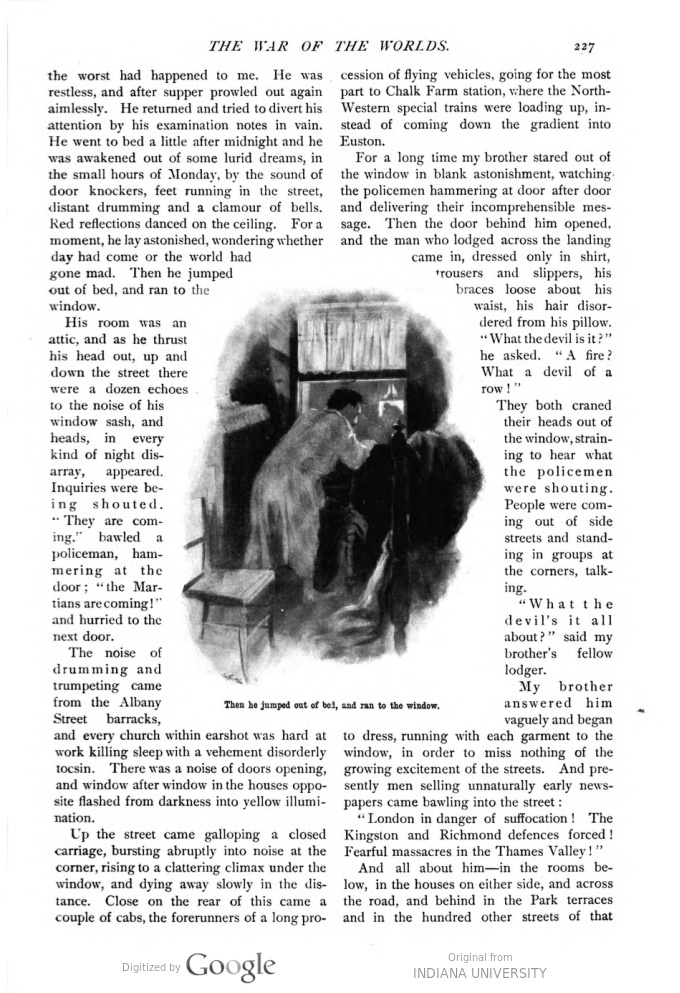
[text marker: start page 227] the worst had happened to me. He was restless, and after supper prowled out again aimlessly. He returned and tried to divert his attention by his examination notes in vain. He went to bed a little after midnight and he was awakened out of some lurid dreams, in the small hours of Monday, by the sound of door knockers, feet running in the street, distant drumming and a clamour of bells. Red reflections danced on the ceiling. For a moment, he lay astonished, wondering whether day had come or the world gone mad. Then he jumped out of bed, and ran to the window.
His room was an attic, and as he thrust his head out, up and down the street there were a dozen echoes to the noise of his window sash, and heads, in every kind of night disarray, appeared. Inquiries were being shouted. “They are coming,” bawled a policeman, hammering at the door; “the Martians are coming!” and hurried to the next door.
The noise of drumming and trumpeting came from the Albany Street barracks, and every church within earshot was hard at work killing sleep with a vehement disorderly tocsin. There was a noise of doors opening, and window after window in the houses opposite flashed from darkness into yellow illumination.
Up the street came galloping a closed carriage, bursting abruptly into noise at the corner, rising to a clattering climax under the window, and dying away slowly in the distance. Close on the rear of this came a couple of cabs, the forerunners of a long procession of flying vehicles, going for the most part to Chalk Farm station, where the North-Western special trains were loading up, instead of coming down the gradient into Euston.
For a long time my brother stared out of the window in blank astonishment, watching the policemen hammering at door after door and delivering their incomprehensible message. Then the door behind him opened, and the man who lodged across the landing came in, dressed only in shirt, trousers and slippers, his braces loose about his waist, his hair disordered from his pillow. “What the devil is it?” he asked. “A fire? What a devil of a row!”
They both craned their heads out of the window, straining to hear what the policemen were shouting. People were coming out of the side streets and standing in groups at the corners, talking.
“What the devil’s it all about?” said my brother’s fellow lodger.
My brother answered him vaguely and began to dress, running with each garment to the window, in order to miss nothing of the growing excitement of the streets. And presently men selling unnaturally early newspapers came bawling into the street:
“London in danger of suffocation! The Kingston and Richmond defences forced! Fearful massacres in the Thames Valley!”
And all about him—in the rooms below, in the houses on either side, and across the road, and behind in the Park terraces and in the hundred other streets of that [text marker: end page 227]
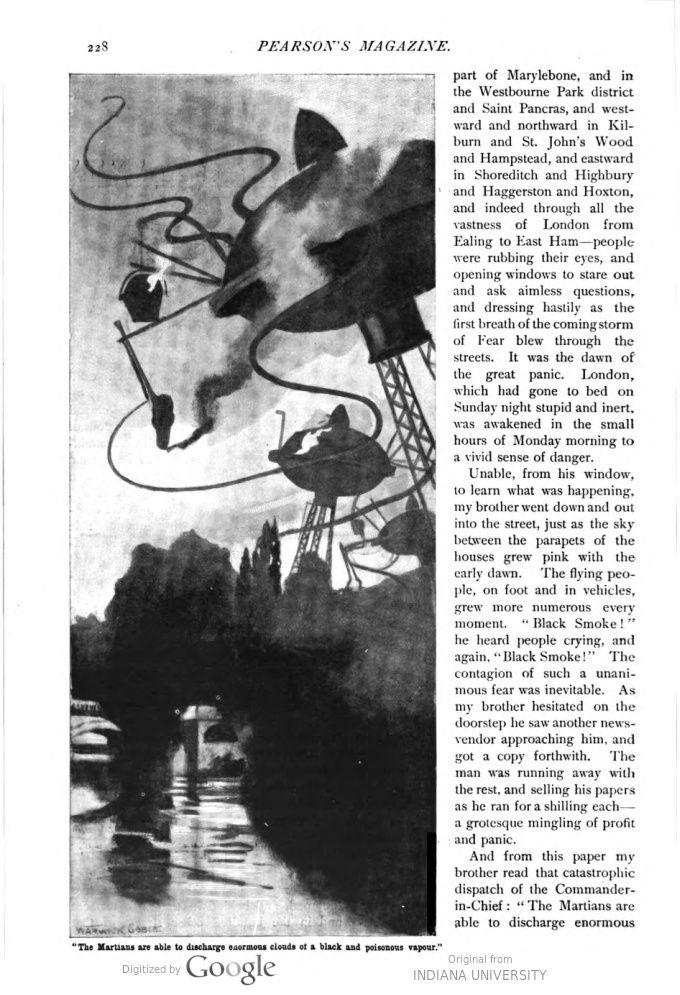
[text marker: start page 228] part of Marylebone, and in the Westbourne Park district and St. Pancras, and westward and northward in Kilburn and St. John’s Wood and Hampstead, and eastward in Shoreditch and Highbury and Haggerston and Hoxton, and indeed through all the vastness of London from Ealing to East Ham—people were rubbing their eyes, and opening windows to stare out and ask aimless questions, and dressing hastily as the first breath of the coming storm of Fear blew through the streets. It was the dawn of the great panic. London, which had gone to bed on Sunday night stupid and inert, was awakened in the small hours of Monday morning to a vivid sense of danger.
Unable, from his window, to learn what was happening, my brother went down and out into the street, just as the sky between the parapets of the houses grew pink with the early dawn. The flying people, on foot and in vehicles, grew more numerous every moment. “Black Smoke!” he heard people crying, and again, “Black Smoke!” The contagion of such a unanimous fear was inevitable. As my brother hesitated on the doorstep he saw another newsvendor approaching him, and got a copy forthwith. The man was running away with the rest, and selling his papers for a shilling each—a grotesque mingling of profit and panic.
And from this paper my brother read that catastrophic dispatch of the Commander-in-Chief: “The Martians are able to discharge enormous [text marker: end page 228]
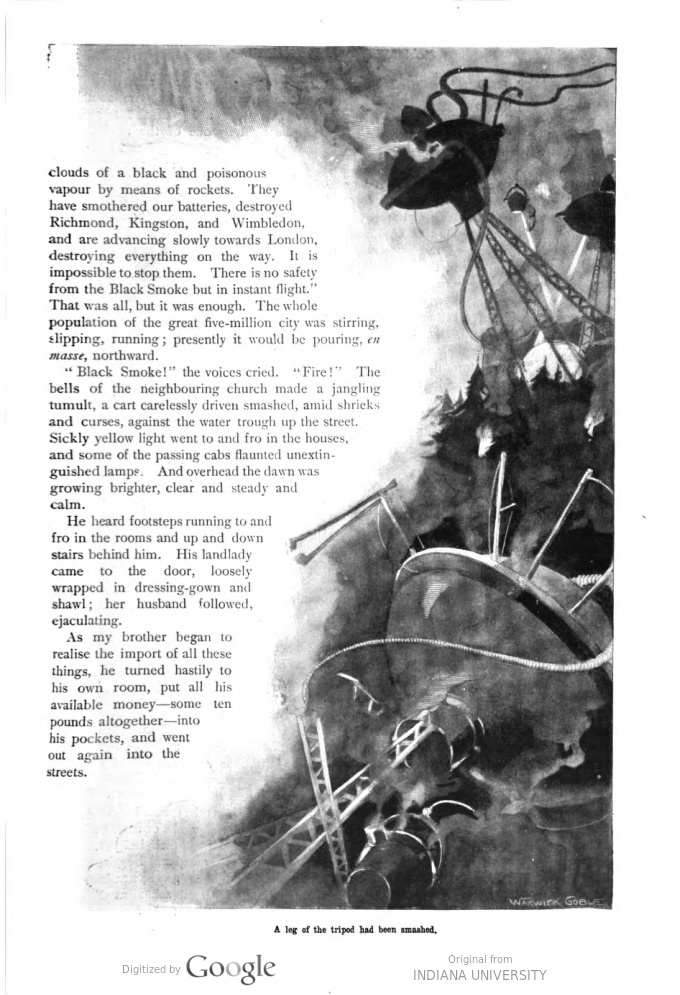
[text marker: start page 229] clouds of a black and poisonous vapour by means of rockets. They have smothered our batteries, destroyed Richmond, Kingston, and Wimbledon, and are advancing slowly towards London, destroying everything on the way. It is impossible to stop them. There is no safety from the Black Smoke but in instant flight.” That was all, but it was enough. The whole population of the great five-million city was stirring, slipping, running; presently it would be pouring, en masse, northward.
“Black Smoke!” the voices cried. “Fire!” The bells of the neighbouring church made a jangling tumult, a cart carelessly driven smashed, amid shrieks and curses, against the water trough up the street. Sickly yellow lights went to and fro in the houses, and some of the passing cabs flaunted unextinguished lamps. And overhead the dawn was growing brighter, clear and steady and calm.
He heard footsteps running to and fro in the rooms and up and down stairs behind him. His landlady came to the door, loosely wrapped in dressing-gown and shawl; her husband followed, ejaculating.
As my brother began to realise the import of all these things, he turned hastily to his own room, put all his available money—some ten pounds altogether—into his pockets, and went out again into the streets.[text marker: end page 229]
[text marker: start page 230]
XV.―WHAT HAD HAPPENED IN SURREY.
It was while I and the curate had sat and talked under the hedge in the flat meadows near Halliford, and while my brother was watching the fugitives stream over Westminster Bridge, that the Martians resumed the offensive. So far as one can ascertain from the conflicting accounts that have been put forth, the majority of them remained busied with preparations in the Horsell pit until nine that night, hurrying on some operation that disengaged huge volumes of green smoke. But three certainly came out about eight o’clock, and, advancing slowly and cautiously, made their way through Byfleet and Pyrford towards Ripley and Weybridge, and so came in sight of the expectant batteries against the setting sun. These Martians did not advance in a body but in a line, each perhaps a mile and a half from his nearest fellow. They communicated with each other by means of siren-like howls, running up and down the scale from one note to another.
It was this howling and the firing of the guns at Ripley and Saint George’s Hill that we had heard at Upper Halliford. The Ripley gunners, unseasoned Artillery volunteers who ought never to have been placed in such a position, fired one wild, premature, ineffectual volley, and bolted on horse and foot through the deserted village, and the Martian walked serenely over their guns without using his Heat Ray, stepped gingerly among them, passed in front of them, and so came unexpectedly upon the guns in Painshill Park, which he destroyed. The St. George’s Hill men, however, were better led or of a better mettle. Hidden by a pine wood as they were, they seem to have been quite unexpected by the Martian nearest to them. They laid their guns as deliberately as if they had been on parade, and fired at about a thousand yards range.
The shells flashed all round the Martian, and they saw him advance a few paces, stagger, and go down. Everybody yelled together, and the guns were reloaded in frantic haste. The overthrown Martian set up a prolonged ululation, and immediately a second glittering giant, answering him, appeared over the trees to the south. It would seem that a leg of the tripod had been smashed by one of the shells. The whole of the second volley flew wide of the Martian on the ground, and simultaneously both his companions brought their Heat Rays to bear on the battery. The ammunition blew up, the pine trees all about the guns flashed into fire, and only one or two of the men who were already running over the crest of the hill escaped.
After this it would seem that the three took counsel together and halted, and the scouts who were watching them report that they remained absolutely stationary for the next half hour. The Martian who had been overthrown crawled tediously out of his hood, a small brown figure oddly suggestive from that distance of a speck of blight, and apparently engaged in the repair of his support. About nine he had finished, for his cowl was then seen above the trees again.
It was a few minutes past nine that night when these three sentinels were joined by other Martians carrying thick black tubes in their tentacles. A similar tube was handed to each of the three, and the seven proceeded to distribute themselves at equal distances along a curved line between Saint George’s Hill, Weybridge, and the village of Send, south-west of Ripley.
A dozen rockets sprang out of the hills before them so soon as they began to move, and warned the waiting batteries about Ditton and Esher. At the same time four of their fighting machines, similarly armed with tubes, crossed the river, and two of them, black against the western sky, came into sight of myself and the curate, as we hurried wearily and painfully along the road that runs northward out of Halliford, looking back every moment expecting this thing.
They moved, as it seemed to us, upon a cloud, for a milky mist covered the fields and rose to a third of their height. At the sight the curate shouted and began running, but I knew it was no good running from a Martian, and I turned aside and crawled through dewy nettles and brambles into the broad ditch by the side of the road. [text marker: end page 230]
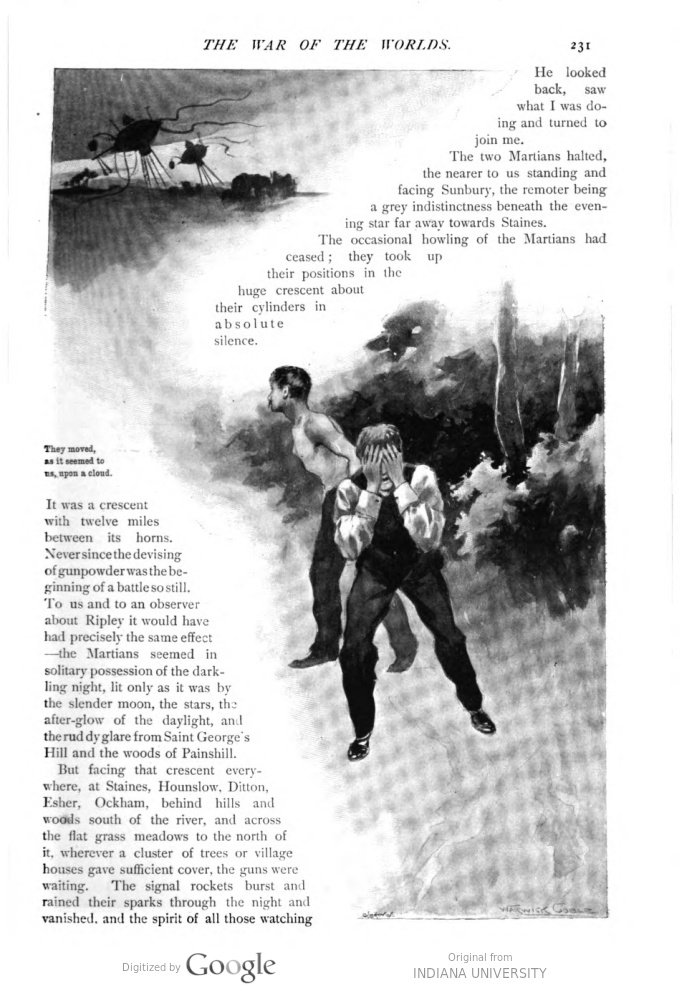
[text marker: start page 231] He looked back, saw what I was doing and turned to join me.
The two Martians halted, the nearer to us standing and facing Sunbury, the remoter being a grey indistinctness beneath the evening star far away towards Staines.
The occasional howling of the Martians had ceased; they took up their positions in the huge crescent about their cylinders in absolute silence. It was a crescent with twelve miles between its horns. Never since the devising of gunpowder was the beginning of a battle so still. To us and to an observer about Ripley it would have had precisely the same effect—the Martians seemed in solitary possession of the darkling night, lit only as it was by the slender moon, the stars, the after-glow of the daylight, and the ruddy glare from Saint George’s Hill and the woods of Painshill.
But facing that crescent everywhere, at Staines, Hounslow, Ditton, Esher, Ockham, behind hills and woods south of the river, and across the flat grass meadows to the north of it, wherever a cluster of trees or village houses gave sufficient cover, the guns were waiting. The signal rockets burst and rained their sparks through the night and vanished, and the spirit of all those watching [text marker: end page 231]

[text marker: start page 232] batteries rose to a tense expectation. The Martians had but to advance into the line of fire, and instantly those motionless black forms of men, those tubes glittering so darkly in the early night, would explode into a thunderous fury of battle.
No doubt the thought that was uppermost in a thousand of those vigilant minds, even as it was uppermost in mine, was the riddle, how much they understood of us? Did they grasp that we in our millions were organized, disciplined, working together? Or did they interpret our spurts of fire, the sudden stinging of our shells, our steady investment of their encampment, as we should the furious unanimity of onslaught in a disturbed hive of bees? Did they dream they might exterminate us? (At that time no one knew what food they needed.) A hundred such questions struggled together in my mind as I watched that vast sentinel shape. And in the back of my mind was the sense of all the huge unknown and hidden forces Londonward. Had they prepared pitfalls? Were the powder mills at Hounslow ready as a snare? Would the Londoners have the heart and courage to make a greater Moscow of their mighty province of houses?
Then, after an interminable time as it seemed to us, crouching and peering through the hedge, came the sound like the distant concussion of a gun. Another, nearer, and then another. And then the Martian beside us raised his tube on high and discharged it gunwise, with a heavy report that made the ground heave. The Martian towards Staines answered him. There was no flash, no smoke, simply that loaded detonation.
I was so excited by these heavy minute guns following one another, that I so far forgot my personal safety and my scalded hands as to clamber up into the hedge and stare towards Sunbury. As I did so a second report followed, and a big projectile hurtled overhead towards Hounslow. I expected at least to see smoke or fire or some such evidence of its work. But all I saw was the deep blue sky above, with one solitary star, and the white mist spreading wide and low beneath. And there had been no crash, no answering explosion. The silence was restored, the minute lengthened to three. “What has happened?” said the curate, standing up beside me. “Heaven knows!” said I.
A bat flickered by and vanished. A distant tumult of shouting began and ceased. I looked again at the Martian, and saw he was now moving eastward, along the river bank, with a swift rolling motion.
Every moment I expected the fire of some hidden battery to spring upon him. But the evening calm was unbroken. The figure of the Martian grew smaller as he receded, and presently the mist and the gathering night had swallowed him up. By a common impulse we clambered higher. Towards Sunbury was a dark appearance, as though a conical hill had suddenly come into being there, hiding our view of the further country. And then, remoter across the river, over Walton, we saw another such summit. These hill-like forms grew lower and broader even as we stared.
Moved by a sudden thought, I looked northward, and there I perceived a third of these cloudy black kopjes had arisen.
Everything had suddenly become very still. Far away to the south-east, marking the quiet, we heard the Martians hooting to one another, and then the air quivered again with the distant thud of their guns. But the earthly artillery made no reply.
(To be continued next month.)
[text marker: end page 232, end installment 5]

